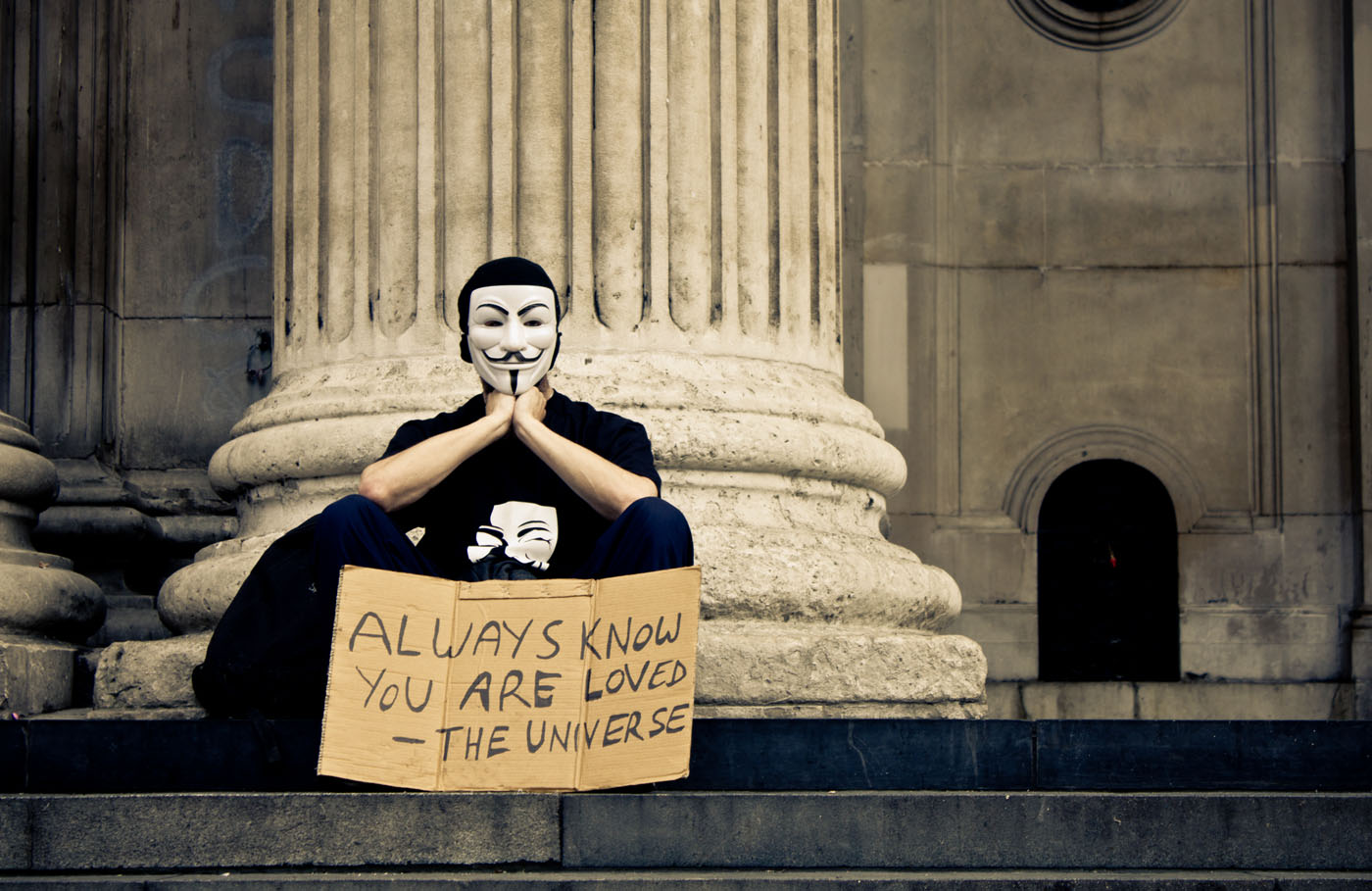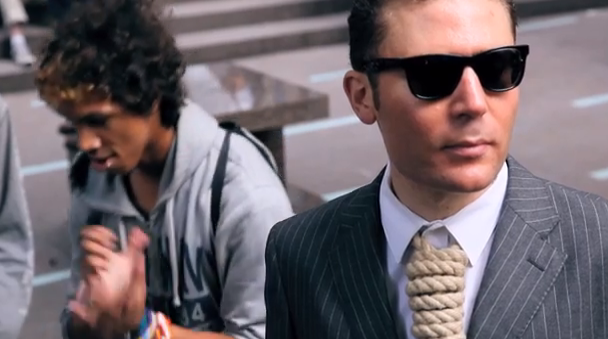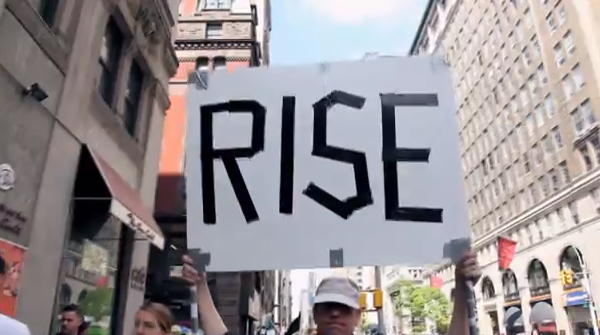In 2010, in the small and temperate town of Tiquipaya, Bolivian President Evo Morales hosted a World People’s Summit on Climate Change, a conference organized in response to what many perceived to be the inadequate outcome of the Copenhagen Summit in 2009. There, Velcrow Ripper, a Canadian documentary filmmaker, asked the President, “How can the climate crisis be turned into the greatest love story on Earth?”
That innocuous and seemingly immaterial question became the basis for Occupy Love, the third film in a documentary series that began in 2006 with the Genie Award-winning Scared Sacred.
In the first film, Ripper (born Steve) journeyed to the “ground zeroes” of the world, from Afghanistan and Hiroshima to New York City in the aftermath of 9/11, looking for stories of hope and survival. Now, with Occupy Love, Ripper has attempted to situate Occupy Wall Street and other global protests within the framework of a love story.
“Great love stories involve yearning to be together, separation, forces that keep the lovers apart,” biologist Rupert Sheldrake says in the film. “The big separation that’s happened here is the separation of humanity and nature, which has been brought about by a framework of thought.”
When he began filming in 2010, Occupy Wall Street was still a nonentity. Ripper cast a wide net, visiting the G20 summit in Canada and later the Tahrir Square protests in Cairo and the European Summer in Madrid in 2011, as well as a Zen center in New Mexico. Although Occupy became the focus of the film, it is framed by these concurrent expressions of discontent and compassion. At the Alberta Tar Sands, a member of the Indigenous Environmental Network pulls back the collar of his T-shirt to reveal a tattoo: “Love is the Movement.”
In the film, love is defined not by the romantic attachments with which much of modern cinema is preoccupied, but by an attitude of empathy, caring and understanding toward humanity and the environment. It is an uncommon narrative, one that is absent from most protest coverage, and it makes a compelling case for the forgotten tenderness of the Zuccotti Park occupation.
“There was a beautiful sign at May Day that said, ‘All our grievances are connected,'" Ripper said. “I think that’s an important part of Occupy Love. The core is about people coming together, trying to make their community and their world a better place. We don’t want to simplify and lump them together, but we still are united. Occupy Sandy is now a great model of that; what I saw was people coming together and supporting each other in this beautiful way.”
Occupy Love spends a little time with the familiar narratives of Occupy Wall Street: the attempted evictions, the clashes with police and injuries sustained. But it lingers on the moments that have received far less attention. Children distribute free newspapers while volunteers serve hot meals. Generators are powered by bicycles and rainwater passes through a makeshift filtration system. There are drum circles, naturally, and impassioned conversations between people who might otherwise never have met. As the temperature drops, volunteers hand out thermal blankets and bananas and medics perform spot checks.
“The love story is people getting to know each other, based on their human experience,” a member of Occupy the Hood says in the film. “I’ve never felt so human in my life.”
In one particularly touching moment, Ripper visits with a young environmentalist. “It’s like a little temple of seeds, you see?” the child says, carefully splitting open an orange flower. “Nature doesn’t yell at you, it doesn’t tell you what to do. It makes you feel peaceful. It doesn’t make you think of bad things. Nature doesn’t want to control things.”
Occupy Love is aesthetically as well as emotionally striking, compounding charged scenes of political protest and civil injustice with art-film tropes: a flower that blooms and quickly dies, billowing black smokestacks silhouetted against a golden sunset, an underwater city, its inhabitants frozen and still like the ruins of Pompeii.
There are moments when the future seems utterly bleak, and the world appears to be rapidly, unstoppably disintegrating. Evidence of humanity’s cruelty towards the Earth and toward ourselves abounds: spiraling debt, ecological crisis, demonstrations that erupt in mass slaughter. In Tahrir Square, Ripper records protesters as they are doused with gas by police. He pans over the desolate wasteland of the Alberta Tar Stands, where there once stood a boreal forest.
“Are we predatory, competitive by nature?” Ripper muses in the film. “Are we self-interested, materialistic, utilitarian, seek only to perpetuate our survival and driven by libido? If that’s who we are, we’re likely doomed.”
The solution put forward in Occupy Love is that love, combined with action, is the key to opposing a society that seems predatory and a planet that appears doomed. The ideology is indebted to Martin Luther King Jr., whose words feature prominently in the film: “Power without love is reckless and abusive, and love without power is sentimental and anemic. Power at its best is love implementing the demands of justice, and justice at its best is power correcting everything that stands against love.”
“Love and power together is enough to save the world, but not love alone,” Ripper said. “We need to accelerate change, a paradigm shift, and it’s got to be rooted in love. That’s the only way we’ll be able to keep ourselves anchored. But we need to be fierce and uncompromising in that love, and we’re going to have to revolt.”
There is an acknowledged bias in Occupy Love. Ripper makes no secret of the fact that he has an involvement with and an admiration for Occupy. As shots of protesters’ placards – “I Care About You,” “Occupy Your Heart,” “We Truly Love the 1% But the System Needs to Reinvent,” “The Beginning is Near” – come up against footage of police attacking protesters, the message can seem heavy-handed. Zuccotti Park was plagued by theft, violence and sexual assault. (Lauren DiGioia, who is featured in the film, was groped while she was sleeping, but later railed against the officers who handled her case, carrying a sign that read, “I was more victimized by the NYPD who handled my sexual assault case than I was by the assaulter.”)
Nonetheless, the evidence Ripper supplies for the tenderness of Occupy argues convincingly that media coverage of Occupy was shamefully one-sided.
“In any large group, you’re always going to find people doing stupid things,” Ripper said. “Unfortunately, it’s very easy to amplify those things, and I think that’s been done quite a bit to Occupy in order to undermine them. The film is focusing on the movement at its best, and the movements in general at their best. It’s for those of us who came at it with the very best of intentions, and that, I think, is the majority.”
Occupy Wall Street lost steam following its eviction from Zuccotti Park, and its newer branches have attracted far less attention. The film is likewise framed by the demise of the Zuccotti moment. “There was something very unique and special at that time, the ability to gather like that, that is being lost when people are just meeting in working groups,” Ripper said.
However, he feels that the movement’s spirit remains intact, not only in Occupy’s offshoots but in the rising tide of global unrest that may, indeed, suggest that the beginning is near.
“I started out looking for the perfect love story,” he concludes. “But what I found instead was something much more beautiful: a messy love, an imperfect love – a human love.”
3 WAYS TO SHOW YOUR SUPPORT
- Log in to post comments

















